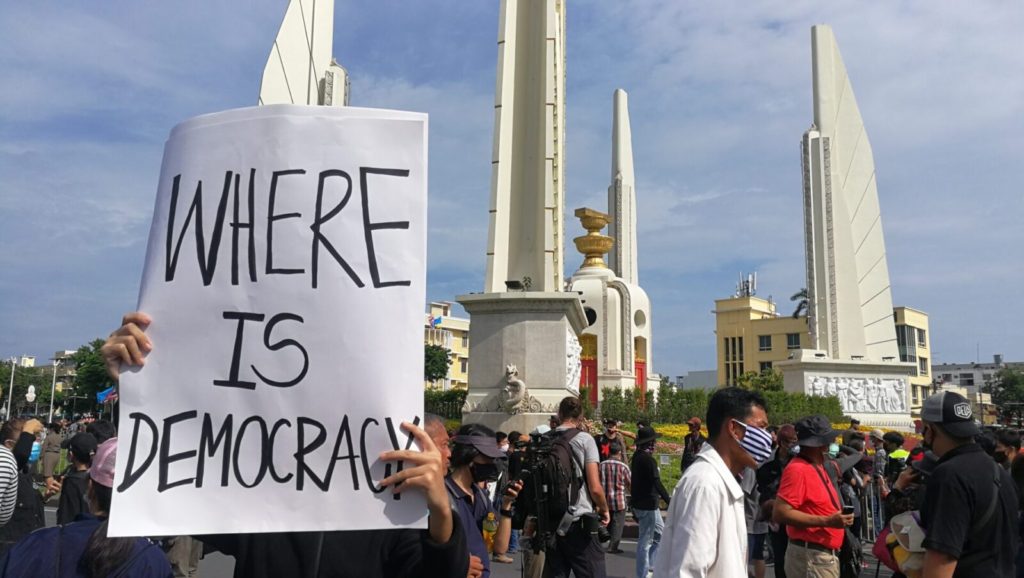“Down with dictatorship, long live democracy.” – Protest chant
On August 16, 2020, more than 10,000 protesters mobilized at Bangkok’s Democracy Monument to demand political reforms. An outburst of frustration toward the failed administration of Prime Minister Prayuth Chan-ocha and his military junta government, the gathering was the largest public protest since the 2014 coup d’état that brought Prayuth to power. Protesters decried the persistent political and socio-economic problems that have gone unaddressed by the current undemocratic regime.
Students have been the vanguard of the new democratic movement. Thai Lawyers for Human Rights (TLHR) has documented at least 85 flash mobs at schools and universities across Thailand from February 21 to March 14, after the dissolution of the opposition Future Forward Party, which has gained popularity among the youth since the 2019 national elections. The party’s dissolution was a turning point that confirmed to the public that Thailand’s political system is rigged.
During the COVID-19 pandemic, restrictions on public gatherings temporarily subdued the protest movement. But even during this period, various social groups decided to air their grievances online, using the hashtag #MobFromHome to condemn abuses of power, socio-economic injustice, and the disappearance of Wanchanlerm, a Thai activist abducted in Cambodia in June.
Since restrictions on gatherings have eased, more than 70 demonstrations have erupted across the country after a group called the Free Youth Movement staged a rally on July 18. The student-led demonstrations have coalesced around the three concrete demands: an end to the harassment of dissidents, redrafting the constitution, and the dissolution of parliament. Moreover, they oppose military control of government and seek to institute a truly constitutional monarchy.
Saying the unsayable
“We dream of seeing the monarchy that coexists in Thai society and a constitutional monarchy where the monarchical institution is truly above politics. Sincerely, we request the institution to join our dream and make it come true. Then the Thais can proudly say to the world that we are under a truly constitutional monarchy.” – Arnon Nampa
Calls for monarchical reform were initiated by human rights lawyer Arnon Nampa at a Harry Potter-themed protest on August 3, where he urged Thais to publicly and candidly discuss the role of the monarchy in line with democratic principles.
After that, a student group issued a 10-point manifesto about reforming the monarchy. It recommended that the monarchy be more accountable to the public and better adapted to the modern era. It also called for precluding the monarchy from being exploited as a political tool, prohibiting the monarchy from expressing political opinions in public or endorsing military coups. It called for the separation of the royal family’s personal assets from those of the monarchy as a national institution, the latter of which should instead be managed by the Ministry of Finance. The memorandum also called for the abolition of the lèse-majesté law that is routinely used to threaten dissidents, and for investigations into past killings of people who have criticized the monarchy.
These protests have triggered unprecedented public discussion about the role of Thailand’s monarchy.
Let it end in our generation
Students have historically been at the forefront of political activism in Thailand, especially during the 1960s and 1970s. Although their role waned over the ensuing decades, students are now, once again, playing critical role in demanding political change.
The students of the Free Youth Movement have forged alliances with other social groups by forming the Free People Movement, which includes intellectuals, workers, peasants, women, and LGBT activists. On August 16, representatives of all these social movements gathered to demand change. Thousands of protesters listened to speeches about the impact of unaccountable development projects on farmers, forced disappearances, impunity, criminalized abortion, stigmatization and discrimination against LGBT people, conflict in southern Thailand, and authoritarian rules at schools. The activists expressed the hope to be the last generation to experience these injustices.
A new era of mobilization
Student-led demonstrations represent a new form of horizontal mobilization. Many have been organic, and all have echoed similar demands. Students have strategically used online and offline platforms to advance their positions. Previously, they were critiqued for being online protesters indulging in hashtag activism. The recent demonstrations prove that political messages shared on social media have the power to mobilize people in the street. Norms that have long gone unexamined are finally being criticized out in the open.
Many student-led demonstrations have utilized popular culture to creatively engage more people in their mobilizations. For instance, they have used fictional characters such as Hamtaro and Harry Potter as protest themes. Also, running and rap music have galvanized people to discuss political issues. The demonstrations are replete with symbolism, such as the three-finger salute for democracy, inspired by the Hunger Games films; white ribbons representing resistance to authoritarianism; and sheets of plain white paper symbolizing freedom of expression. The ubiquity of these symbols across Thailand appears to have alarmed the government.
We are not nation-haters
“COVID-19 is curable…but nation hatred is incurable.” – Apirat Kongsompong, Commander-in-Chief of the Royal Thai Army
Nation-hatred is a political discourse invented by Thai conservatives to discredit those who demand democracy and equal political and civil rights. They strongly believe that political dissidents are undermining the Thai traditional values, especially the hierarchical structure of phu yai (a superior) and phu noi (an inferior), and the three core institutions – nation, religion, and monarchy. In the past, the Thai right wing has successfully invented discourses that have dehumanized and criminalized opponents, branding them as national enemies deserving of death.
While these conservative elements are trying to do the same thing to today’s youth protesters, the protesters argue that they are not nation-haters. Rather, they are expressing their love of their country in a different way. In their view, democratic values, human rights, and equality must be integrated into Thai traditional values and institutions. They hope to bring about free and fair elections, social justice, and equality so that people who exercise their democratic rights are protected. This may not be the nationalism of conservative elites, but it is nonetheless rooted in love of country.
Prime Minister Prayuth Chan-ocha has made a show of offering opportunities for peaceful dialogue with the protesters. However, the Internet Law Reform Dialogue (iLaw) has documented at least 79 cases where demonstrators have been intimidated by government authorities since July 18.
The authorities have violated the rights of protesters in numerous ways, including with arrests, lawsuits, recording personal identities, photographing without permission, house visits, stalking, and browbeating protesters through their family members or teachers. Despite the harm caused by these tactics, many protesters have vowed to continue demonstrating until their political demands are met.
(Supatsak Pobsuk is the Thailand Program Officer for Focus on the Global South.)




